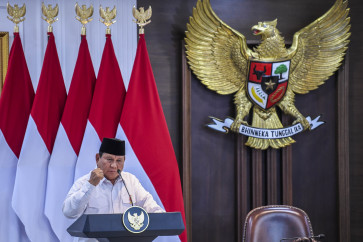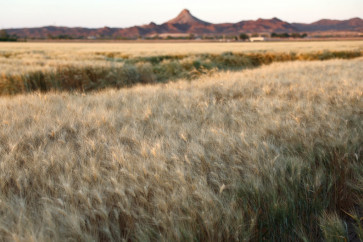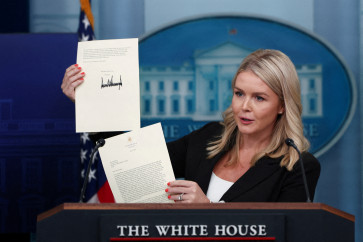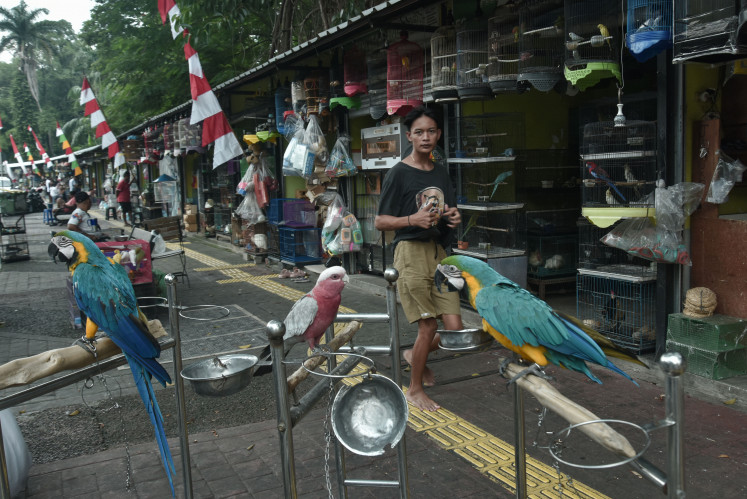Popular Reads
Top Results
Can't find what you're looking for?
View all search resultsPopular Reads
Top Results
Can't find what you're looking for?
View all search resultsDelia Murwihartini: Dowa Bag, prayer and dream
(JP/Juliana Harsianti)There are two things that made Delia Murwihartini, owner of Dowa Bag, a successful handbag entrepreneur: First, her reluctance to become a mere employee and second, her deep love for fashion
Change text size
Gift Premium Articles
to Anyone
(JP/Juliana Harsianti)
There are two things that made Delia Murwihartini, owner of Dowa Bag, a successful handbag entrepreneur: First, her reluctance to become a mere employee and second, her deep love for fashion.
'By the time I had almost finished college, I saw my friends hunting for jobs that did not offer a very high salary,' Delia, also known among friends as Dolly, said. 'I was thinking, why not set up my own business? And employ people instead?'
Her heart was set on bags because of her love of fashion; she thought building upon something that she loved would help sustain her. When she started about 20 years ago, she was young, but she was not naïve. She knew setting up her own business would pose a lot of challenges.
'I started with selling leather bags produced by many artisans in Yogyakarta,' she went on. At that time, foreign tourists especially from Europe loved leather bags from Yogyakarta, she said. To compete with other sellers, Dolly asked her artisans to refine their sewing techniques and to do tanning to produce a favorable leather smell. Her strategy reaped success; her bags consigned to stores in tourist hub Jl. Prawirotaman were sold out and there was one tourist who ordered dozens of her bags.
Dolly said her fashion references were from London, Milan, Paris and New York. One of her investments was attending fashion weeks across Europe and the US.
'Of course you can see anything on the Internet. But I want to feel the vibe myself. Without experiencing it myself, I would not be able to keep my designs up to date.'
Fashion weeks also allowed her to meet buyers and other bag entrepreneurs, which helped her to expand her network and knowledge. From these sorts of events Dolly managed to get big names like Francesco Biasia and Mazzini to order bags from her.
It was in Europe that Dolly got the idea to make nylon crochet bags, now her main line. In the 1990s a business partner in Italy told her to make crochet bags that she predicted would become a trend. The partner asked Dolly whether she could make crochet bags as well as leather bags. She brought home a sample to explore the possibilities of producing such bags.
Her first challenge was to find the correct material. The specific nylon threads were not readily available in stores so Dolly had to make a custom order to a thread factory. The next challenge was to produce crochet bags that were handcrafted but of consistent quality. Her artisans told her that handmade technique would not bring a 100 percent consistent quality. In the beginning she did not make a big deal out of it; her buyers understood. But she nevertheless committed to meet a certain
standard.
'Now, the bags are very close to the quality I envisioned.'
She later chose crochet bags and left the leather bag world to concentrate on enhancing the quality of her crochet bags.
'If I produced leather and crochet, I would have compromised the quality of one of them. And for me, quality is everything.'
Time proved that she made the right choice. Dolly spread her wings to the US and became a vendor for The Sak, on top of orders from Europe's top brands. As a vendor, she made sure she maintained the quality of her products and did not yield to the temptation to make knock offs. She said she would not put her reputation at stake.
Instead, she decided to design her own private brand, Dowa Bag. Dowa is a Sanskrit word meaning prayer; something that she said helped her face the challenges in business and life.
Her business acumen, tested in the international market, helped propel her brand to fame. First, she registered her brand with the government to ensure no one used Dowa Bag. Later, she made sure that Dowa Bags were exclusive and unique; she wanted people to immediately recognize her brand.
To keep her products up to date, she released a new collection once every three to four months, each with a different color palette. She still regularly visits the four fashion cities as a businesswoman.
'Someday, perhaps I can enjoy fashion week as a tourist [rather than as a business trip]. But I think that day is still a long way.'
It was not only at fashion week that Dolly 'collected' inspiration. She has an ample collection of branded fashion items, especially bags. She said she never used her bags.
'Instead, I displayed them at showcases, as an inspiration and reminder that someday Dowa would be on par with those legends.' Dolly shelled out a lot of money to buy her Prada, Miu Miu, Chanel and Hermes bags. She said she touched the bags to feel the craftsmanship, sewing and texture.
She also takes inspiration from the visual arts. More than collecting art works, Dolly recently collaborated with visual artist from Yogyakarta, Dian Anggraini, to become a guest designer for her scarf line. The scarves would be limited edition prints to keep the exclusivity, Dolly said, showing her bright orange scarf designed by Dian.
Dolly said her success was thanks to hard work and consistency and not pushing herself over the limit. And with doa (prayers) accompanying her every step and thought, she reached her dream and became one of the most successful businesswomen in the country.










